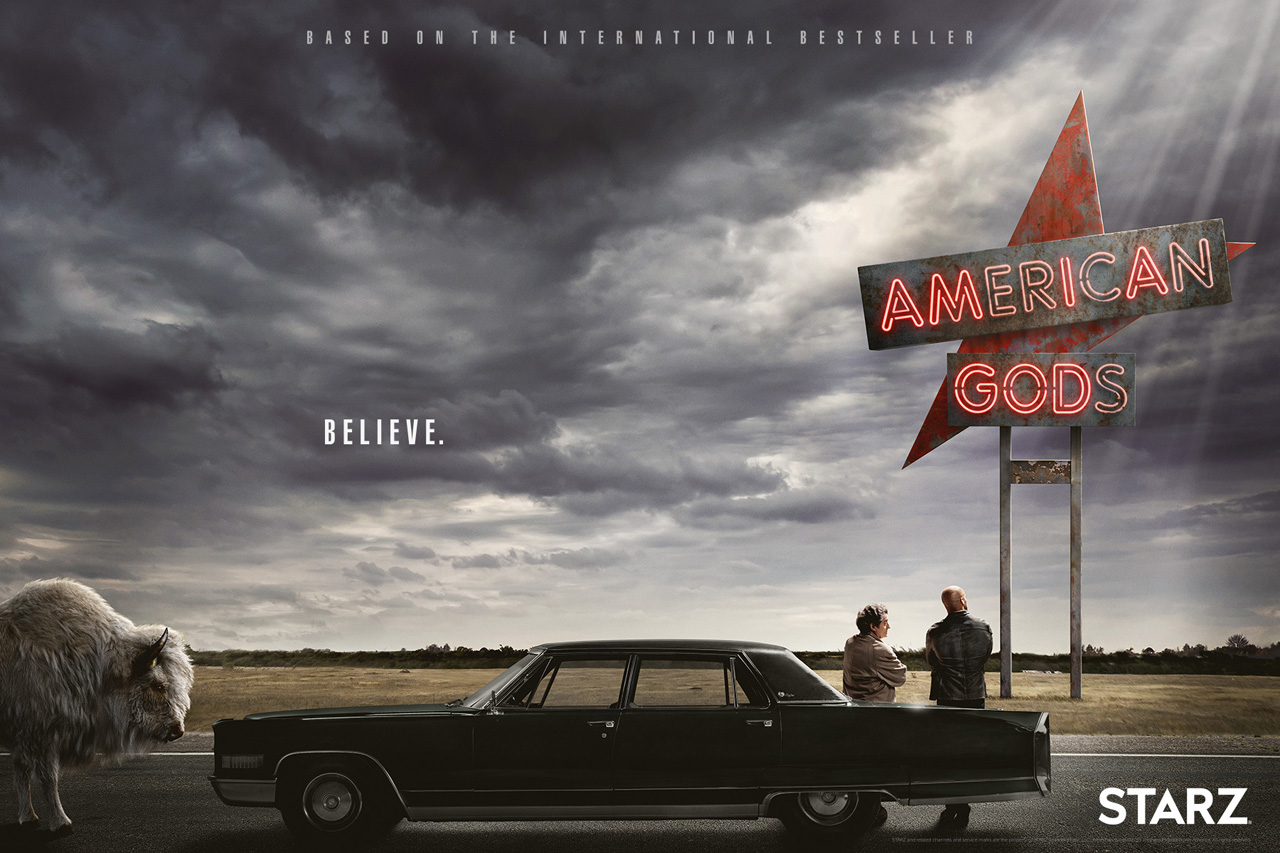Adaptations have to toe a fine line with their audiences. On the one hand, one must consider the newcomers first. If the adaptation fails to tell a compelling story on its own merits, then it doesn’t matter how true to the original it is. On the other hand, if an adaptation strays too far from the essence of what made the source material appealing, it risks alienating its base. The first episode of American Gods is a gorgeous, at times fascinating interpretation of the book. It moves briskly, features incredible cinematography, and certainly entertains. And yet, it shows signs of being both too literal in its portrayal of the book, and not quite true enough to what made it interesting in the first place.
A great example comes early in the episode, when Shadow, the protagonist, is turned away by an airport employee. He flashes back to a conversation he had in prison. A fellow inmate tells him about how he once got out, but after feeling disrespected by an airport attendant, he lost control and ended up back in prison. Shadow remarks that perhaps the lesson here is that prison culture encourages a type of behavior which, when applied to the real world, is instead harmful. “No,” the inmate insists. The real lesson is “don’t piss off those bitches in airports.”
While some dialogue is cut, this is almost exactly how the anecdote is presented in the book. However, in the original text, it plays into the book’s core conceit, which is the co-existence and ultimate inseparability of classic mythology and modern folk storytelling. It’s one of many instances when author Neil Gaiman takes some time out to connect with the charm and/or brusqueness of day-to-day yarn spinning. But in the show, the scene takes on a tense, hyper-real vibe that is at odds with the actual story. It plays into the episode’s over-boding tone, which is never-ceasing. At no point does it feel like a character could enter and make a genuine, light-hearted joke, and it’s ultimately worrying for the future of the show.
This isn’t to say that the moodier material is poorly done. Directed by David Slade and under the guidance of showrunners Bryan Fuller and Michael Green, the pilot is one of the most starkly beautiful things I’ve seen on television this year. When used appropriately, its heightened reality is remarkably effective. The opening sequence deftly blends its stark realism with brutal absurdity. Later, the show manages to take the incredibly graphic and difficult-to-picture introduction to Bilquis and portray it in a way that makes sense and doesn’t feel completely at odds with the rest of the show. This is a highly imaginative adaptation of a nigh-unfilmable novel, and in that respect, it’s admirably true to its source material.
But in other places, American Gods’ adherence to the text of the original novel is detrimental to its cause. This pilot episode is laid out, almost scene-by-scene, exactly the way that it is in the book. This creates a couple of problems. For one, the novel spends a lot of time inside Shadow’s head, interpreting and characterizing the otherwordly events that surround him. Obviously you wouldn’t want to recreate this in a visual adaptation, but by strictly portraying everything that happens to him, scene after scene, with little time to grasp the humanity behind it all, it can feel very rushed
Another problem is that a novel is structurally very different than a TV season. Where chapters can be however long or short as an author wants them to be, TV shows are made up of a series of similar-length installments that generally need some sort of central story or theme to hang together each week. The American Gods pilot jumps all over the place and introduces all sorts of characters and elements, but because the jumps are dictated by where their chapters occurred in the novel rather than for any episodic reason, it has little to hang itself around. The final scene, for example, deals with Shadow being contacted by the God of Technology, and then being violently rescued from his thugs. It’s an engaging scene on its own, and works great as a chapter in a book, but given how swiftly its introduced and dealt with, it fails to provide a cathartic ending for the episode.
I can’t help but feel like this would have been a stronger episode had it taken on less of the story and expanded upon the novel’s opening. The meade-sealed contract and the fight with Mad Sweeney is a much better cap to the first installment, but it occurs here roughly 2/3 into the episode. And given how brilliantly engaging every one of Ian McShane’s scenes is, I can’t imagine anybody being upset with some additional Shadow-Wednesday time.
I’m wary about making these critiques, because I generally don’t like it when people deride an adaptation for not being as good as the book. But my issues here aren’t with it not being a carbon copy of the original text so much as a miscalculation of what made the original work so engaging. It’s incredibly true to the structure of the novel, but not necessarily the feeling. That being said, only one episode has aired, and perhaps as the season wears on, it’ll settle into a more comfortable groove and take the time to engage on its own merits. If Bryan Fuller’s Hannibal is any indication, he’s not afraid to take bold creative left-turns if they can strengthen his own personal interpretation of a story. I’m very curious to see what that looks like in American Gods.
